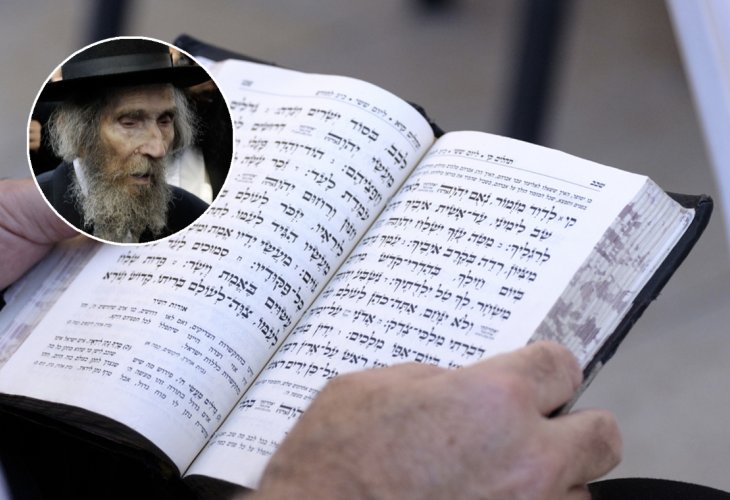Personal Stories
Every Mitzvah Counts: Rabbi Steinman’s Lessons on Life and Kaddish
How Rabbi Steinman’s gentle words and stories teach us what really matters in Jewish life and mourning.
 In circle: Rabbi Steinman of blessed memory (Photo: Flash 90)
In circle: Rabbi Steinman of blessed memory (Photo: Flash 90)1. Prayer is from the Rabbis—Kindness is from the Torah
A young Torah scholar once came to Rabbi Aharon Leib Steinman with a question. “I usually pray Shacharit (the morning prayer) at the Ponevezh Yeshiva,” he said. “But someone asked me to come join a minyan (prayer group) in a house of mourning. What should I do?”
Rabbi Steinman answered gently: “Praying in yeshiva is a very high and special thing. But you should know—while prayer is a rabbinic obligation, acts of kindness like comforting mourners are commanded in the Torah itself.”
2. The Heart of Kaddish is 'Amen Yehei Shmei Rabba'
After Rabbi Steinman once gave a talk at the Ponevezh kollel (advanced Torah learning center), a young man named Rabbi S.V.—who was in the year of mourning for his father—stood up to lead the evening prayers and said Kaddish (the mourner’s prayer) after Aleinu.
Afterward, someone came up to him and said, “Why did you say that Kaddish? That one belongs to Rabbi Steinman! He always says it at the end of prayers, since he doesn’t know when his parents passed away.”
Embarrassed, the young man approached Rabbi Steinman. “I’m so sorry,” he said. “I didn’t mean to take the Rabbi’s Kaddish. I didn’t know you say it in memory of your parents.”
Rabbi Aharon Leib smiled warmly. “First of all, there’s no problem at all,” he said. “You have a true obligation, and I don’t know the exact yahrzeit (anniversary of passing) of my parents. And second—Kaddish doesn’t belong to anyone. It’s a mitzvah (good deed) to bring merit to a departed soul by sanctifying Hashem’s name. The most important part is when people answer ‘Amen, Yehei Shmei Rabba.’ So what if you said it? I said ‘Amen’—and that’s what matters! Everything’s fine.”
3. Every Mitzvah Elevates the Soul
On another occasion, someone asked Rabbi Steinman whether a person must insist on saying Kaddish, or if it’s okay to give it up sometimes.
He replied: “Is this how we sanctify Hashem’s name—by fighting over a mitzvah? What will people say—that a righteous person refused to let someone else say it? The truth is, every mitzvah, every good deed a child does brings merit to the soul of their parents. You don’t even have to say, ‘for the elevation of their soul.’ It happens on its own because the child is connected to them. Every word of Torah you learn, every good deed you do—it all brings your parents' souls higher.”
4. Doing is the Real Kaddish
Rabbi Steinman once shared this story about Rabbi Shlomo Lorenz, a respected member of the Knesset. One day, after a long day of important public work, he suddenly realized he hadn’t said Kaddish. He was still in the year of mourning for his mother.
Deeply upset, he went to the Chazon Ish and said, “If I’ve reached a point where I can forget to say Kaddish for my mother, maybe I shouldn’t be working in public service at all.”
But the Chazon Ish gently corrected him: “You did say Kaddish. Do you think the main thing is to say the words? It’s to do something meaningful. That is Kaddish.”
5. A Two-Word Reminder
A few months before Rabbi Steinman passed away, he was hospitalized with severe pneumonia and was in great danger. By a true miracle, he recovered and was able to go back home.
As he was leaving the hospital, the doctor smiled and said, “Rabbi, you know you’re alive only because of open miracles.”
Rabbi Steinman looked at him and simply said two words: “So are you.”
It’s something we should all remember—every moment of life, every breath we take, is a miracle. Whether we are old or young, healthy or sick, it’s all from Hashem.

